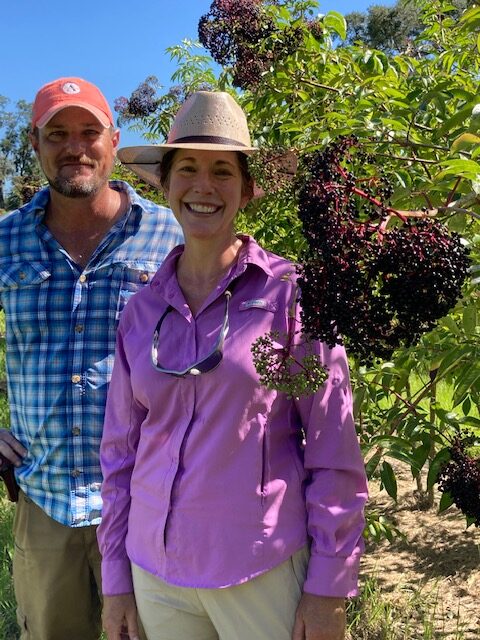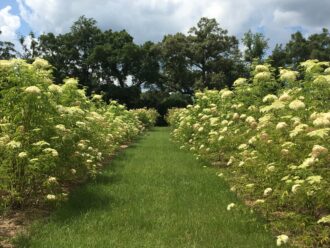CHIEFLAND, Florida – Elderberry, internationally utilized and popular for centuries for its perceived medicinal and health benefits, may have potential as an alternative crop in Florida.
Farmers Heather Martin and David Jarnagin of Hyldemoer + Co. in north central Florida have been testing elderberry (Sambucus spp.) varieties for the past several years for commercial production. They received a Southern Sustainable Agriculture Research and Education (SSARE) Producer Grant to assist in finding varieties that are best suited for Florida’s subtropical environment in terms of productive organic cultivation, insect and disease resistance, and flower and berry quality, while producing the highest antioxidant qualities and flavorful value-added products.
Martin appreciates elderberry’s unique character and its worldwide appeal for its potential medicinal and health benefits. Hyldemoer + Co. is focused on producing elderberry products that consumers can enjoy every day and not only when they are feeling under the weather. According to Martin, there is a storied history of using elderberry for wine and as a wine additive. “Elderberry wants to be wine,” said Martin. As a well-established wine market for muscadine grapes already flourishes in Florida, Martin hopes that elder wine and elder/muscadine blends will further enhance that existing industry.
Jarnagin said that elderberry hasn’t caught on in Florida as a potential alternative crop partly because the native Florida elderberry, which grows wild, is not ideally suited for commercial agricultural cultivation.

“The Florida elderberry is incredibly indeterminate as compared to other strains of the same species.” Additionally, the flowers are of poor quality when compared to varieties with commercial potential. The thin-skinned berries, like all elderberries, have little to no storage life and are prone to spoilage if not processed in a timely manner. “However,” said Jarnagin, “the Florida plant is incredibly hardy and can be relatively productive under proper organic management strategies.”
As part of the knowledge gained from the SARE-funded project, Jarnagin believes that using the Florida types as root stock in grafting may have merit. This could allow for retention of the commercial production qualities that he and Martin are looking for while retaining the drought-tolerance and disease resistance characteristics of the native Florida strains. Additionally, Jarnagin and Martin tested European varieties, genotypes from throughout the US, and stock from named varieties from Missouri’s successful elderberry program.
In all, well over 60 varieties were tested during a 3-year period for hardiness, insect and disease resistance, chill hour requirement, yield, flower and berry quality, and nutraceutical quality analysis. From the study, roughly two dozen “finalists” were identified and later refined to 12 with 3 exceptional candidates to make up the largest percentage of further expansion.

Martin and Jarnagin have received a $125,000 Small Business Innovation Research grant to expand on their work and explore marketing strategies. “One of our goals is to quantify compositional quality for standardization, as well as cultivation practices in Florida and the Southeast,” said David.
Two University of Florida Extension articles were developed as a result of the SSARE-funded project. “Elderberry and Elderflower: A cultivation guide for Florida,” and “Elderberry and Elderflower: Markets, establishment costs and potential returns.” These articles provide information on establishing, producing and marketing elderberry and elderflower in Florida.
For more information on the project and Certified Naturally Grown elderberry and elderflower, visit Hyldemoer + Co.’s website: https://www.HyldemoerFarms.com.
Published by the Southern Region of the Sustainable Agriculture Research and Education (SARE) program. Funded by the USDA National Institute of Food and Agriculture (NIFA), Southern SARE operates under cooperative agreements with the University of Georgia, Fort Valley State University, and the Kerr Center for Sustainable Agriculture to offer competitive grants to advance sustainable agriculture in America's Southern region. This material is based upon work that is supported by the National Institute of Food and Agriculture, U.S. Department of Agriculture, through Southern Sustainable Agriculture Research and Education, under sub-award number: FS19-317. USDA is an equal opportunity employer and service provider. Any opinions, findings, conclusions, or recommendations expressed in this publication are those of the author(s) and do not necessarily reflect the view of the U.S. Department of Agriculture.
